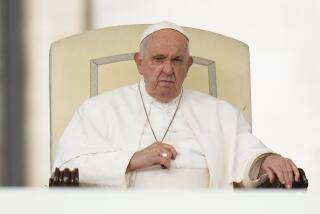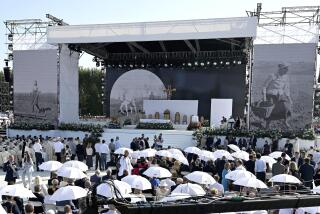Polish Catholic Church Wins Legal Status
- Share via
WARSAW — Parliament enacted a landmark law on Wednesday legalizing the Roman Catholic Church for the first time under Communist rule and restoring the property and privileges stripped from it in the years since the end of World War II in 1945.
The law, which came after years of negotiations between the church and the leadership of Gen. Wojciech Jaruzelski, represents the first full normalization of church-state relations in a Communist state and opens the way for Warsaw to become the first Communist government to establish diplomatic relations with the Vatican.
Jaruzelski was among the 306 members of the Sejm, or Parliament, who voted in favor of the law. Two voted against and 12 abstained.
Under the comprehensive act, the church regained the right to buy and sell property, operate its own businesses, publish newspapers and establish and operate schools, hospitals and even radio and television stations without government interference. Religious orders and lay organizations will no longer be subject to government regulation, and controls on the construction of new churches were abolished.
The government also agreed to return hospitals and other property seized from the church in the 1950s, or to pay compensation in cases in which the church does not wish to take back the property. Officials estimated the compensation will amount to “several billion zlotys,” a sum in the millions of dollars.
Government and church officials described the legislation as marking the end of a long and bitter conflict between the Communist Party and the powerful church, which claims the following of 90% of Poland’s 38 million people. The church thus becomes the second major independent entity in a Communist state that recently re-legalized Solidarity, the East Bloc’s first independent labor movement.
“The essential conditions have been created for ending the division into believers and non-believers still present in public life, with all its consequences,” said party Politburo member Kazimierz Barcikowski.
Process of Political Negotiation
Two other new laws passed by Parliament along with the church measure assure freedom of worship to all faiths and grant social security benefits to Poland’s 62,000-member clergy. Legal experts said the law on worship should end years of state discrimination against Jehovah’s Witnesses.
The conclusion of the package marked the culmination of a process of political negotiation between the church and party that began in 1981 and served as a key influence in the eventual decision by Jaruzelski to restore the political and trade union pluralism he abolished then under martial law.
Courted strongly in the mid-1980s by a party leadership that hoped to stabilize the country with its help, the Catholic hierarchy stoutly held out for pluralism, in large part at the urging of Polish-born Pope John Paul II. When the Pope emphatically defended the Solidarity trade union during a 1987 tour of the country, incipient official hopes of a separate settlement with the Warsaw episcopate under Cardinal Jozef Glemp were extinguished.
After two waves of strikes swept Poland last year, senior church officials were instrumental in setting up the first meetings between Solidarity founder Lech Walesa and Interior Minister Czeslaw Kiszczak--and eventually the “round table” talks that began early this year.
The breakthrough at the round table allowed the party and church to agree to a settlement. The legalization of the church in Poland, a step long sought by the episcopate, is to be matched by the extension of diplomatic recognition to the Communist government by the Vatican.
Vatican and government officials have been negotiating a protocol for relations. Church officials said the formal establishment of diplomatic ties should occur later this year.
More to Read
Sign up for Essential California
The most important California stories and recommendations in your inbox every morning.
You may occasionally receive promotional content from the Los Angeles Times.













